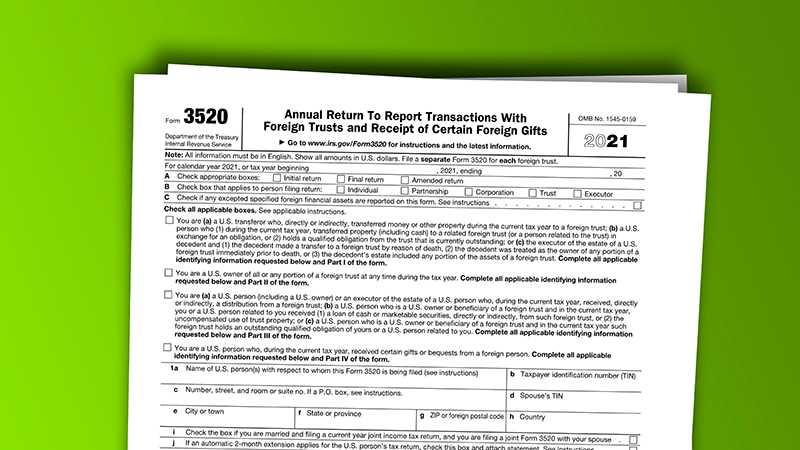IRS Form 3520 inheritance: understanding filing thresholds
Wiki Article
Recognizing the Significance of Coverage Foreign Inheritance to IRS for Tax Conformity
Maneuvering the intricacies of foreign inheritance needs a clear understanding of IRS reporting obligations. Lots of individuals underestimate the relevance of accurately reporting these possessions, which can bring about unintentional effects. Failing to follow IRS guidelines may cause legal issues and substantial fines. It is important to grasp the subtleties surrounding international inheritances to stay clear of mistakes. The complying with areas will make clear important aspects of compliance and the prospective threats entailed.
What Constitutes Foreign Inheritance?
When a private gets possessions from a deceased individual's estate situated outside of the USA, this transfer is taken into consideration an international inheritance. International inheritances can consist of numerous kinds of properties such as actual estate, savings account, financial investments, individual belongings, and business interests. The value and nature of these possessions may differ substantially relying on the regulations and personalizeds of the nation in which the estate lies.Furthermore, the process of acquiring these possessions can include navigating through foreign legal systems, which could enforce details needs or tax obligations associated to inheritance. The recipient may also encounter obstacles in establishing the reasonable market worth of the acquired possessions, particularly if they are not familiar with the neighborhood property or monetary markets. Understanding what constitutes a foreign inheritance is important for individuals to guarantee conformity with both regional laws and any kind of prospective obligations they may have in their home country.
IRS Coverage Requirements for Foreign Inheritance
Just how does one guide through the IRS coverage demands for international inheritance? Individuals that get an inheritance from abroad must know certain reporting obligations to assure compliance with IRS laws. The Foreign Bank and Financial Accounts Record (FBAR) is one necessary requirement; if the complete value of international accounts exceeds $10,000 at any kind of time during the year, it should be reported. Additionally, Type 3520 might be required for reporting international gifts or inheritances over $100,000 from non-U.S. individuals. This form catches details concerning the inheritance, including the resource and quantity. Stopping working to comply with these reporting demands can result in considerable penalties. It is important for receivers to keep complete records of the inheritance, including any kind of documentation from international entities. Consulting with a tax specialist knowledgeable regarding global tax legislations can supply further support in guiding through these reporting obligations efficiently.Tax Obligation Implications of Getting an Inheritance From Abroad
Getting an inheritance from abroad can lug substantial tax implications for individuals, especially as they browse the intricacies of global tax laws. The IRS needs united state residents and citizens to report foreign inheritances, which may activate different tax obligations - foreign gift tax reporting requirements. Although inheritances themselves are generally not thought about gross income, coverage is essential to stay clear of penaltiesFurthermore, the estate might go through estate tax obligations in the foreign country, which can influence the internet worth gotten by the successor. If the inheritance consists of international possessions, such as property or investments, they might include unique tax more information obligation factors to consider, consisting of prospective capital gains taxes upon sale.
Furthermore, individuals may need to adhere to international tax regulations, which can vary markedly from united state regulations. Recognizing these ramifications is important for proper tax obligation compliance and to assure that all responsibilities are fulfilled without incurring legal concerns or unnecessary costs.
Typical Errors to Stay Clear Of When Reporting Inheritance

Steps to Guarantee Compliance With IRS Laws
Comprehending the steps needed to ensure conformity with IRS regulations is vital for anybody reporting a foreign inheritance. Individuals need to validate whether the inheritance surpasses the reporting threshold, which can activate additional demands. Next off, it is important to collect all pertinent documents, including the will, trust fund papers, and documents of the foreign estate's worth.Submitting Kind 3520, which specifically attends to foreign gifts and inheritances, is necessary to inform the IRS of the inheritance. Individuals need to also make sure that any kind of relevant tax obligations connected to the inheritance are paid, including potential inheritance tax in the he has a good point foreign territory.
In addition, keeping accurate documents of all deals and communications concerning the inheritance can give essential support in case of an IRS query. Seeking specialist recommendations from a tax consultant knowledgeable about international tax obligation laws can better improve compliance and alleviate risks connected with reporting international inheritances.
Frequently Asked Inquiries

What Happens if I Fail to Record My International Inheritance?
Falling short to report an international inheritance can result in significant fines, rate of interest on unpaid tax obligations, and prospective legal consequences. The IRS might go after enforcement activities, making complex future financial ventures and conformity obligations for the specific included.Can I Subtract Expenses Associated With Finding Foreign Inheritance?
No, expenses associated with getting an international inheritance are typically not deductible for tax purposes. Inheritance itself is normally ruled out taxed earnings, and linked expenses can not be asserted to decrease tax obligation liability.Exist Penalties for Late Reporting of Foreign Inheritance?
Yes, there are fines for late reporting of international inheritance to the IRS - reporting foreign inheritance to IRS. These can consist of fines and rate of interest on unpaid taxes, making prompt disclosure essential for conformity and staying clear of additional monetary worriesHow Does Foreign Inheritance Impact My State Tax Obligations?
International inheritance may affect state tax obligations in different ways depending upon territory. Some states enforce inheritance or estate taxes, while others do not. It is necessary to get in touch with local policies to figure out details tax obligation ramifications related to foreign inheritance.
Are Presents From Abroad Considered Foreign Inheritance for IRS Purposes?
Gifts from abroad are not identified as foreign inheritance for IRS objectives. IRS Form 3520 inheritance. Rather, they are dealt with individually under present tax obligation policies, with various coverage needs and thresholds that individuals need to stick to for complianceIn addition, the process of acquiring these properties can involve navigating Your Domain Name with international lawful systems, which might impose certain needs or tax obligations related to inheritance. The IRS needs United state people and residents to report foreign inheritances, which may trigger various tax responsibilities. Sending Type 3520, which especially resolves international presents and inheritances, is essential to notify the IRS of the inheritance. Failing to report a foreign inheritance can lead to significant penalties, interest on unpaid taxes, and potential lawful effects. No, costs associated to getting a foreign inheritance are typically not deductible for tax objectives.
Report this wiki page